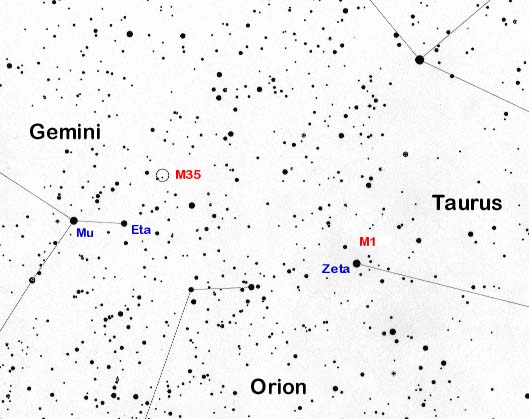![]()
![]()
M1 is a supernova remnant in Taurus. Charles Messier encountered this nebula while observing a comet the morning of August 28, 1758. This would become the first of more than 100 "comet-like" objects Messier would observe and catalog over the next 30 years. Begin your star hop at Zeta Tauri, a magnitude 3.0 star easily visible to the unaided eye. M1 is about a degree to the northwest. A technique you might find useful is to slowly sweep in a circular pattern around Zeta. Start by placing the star just outside the field of view of your low power eyepiece. As long as that field is 1.3 degrees across or more, you will pass over M1 during your first sweep. Watch for the nebulosity out of the corner of your eye. Using averted vision often allows you to observe objects that are not immediately visible under direct examination.
| Winter Sky Tour: M1-The Crab Nebula (Taurus) RA: 5h 34.5m / DEC: +22° 01'.0 |

|
|

Home | About Cosmic Voyage | Getting Started | Deep-sky Observing | Planetary Observing | Astrophotography | Sketching | Glossary | Web Links
URL: http://www.cosmicvoyage.net
Layout, design & revisions © W. D. Ferris
Comments and Suggestions: wdferris1@gmail.com
Revised: February 4, 2002 [WDF]